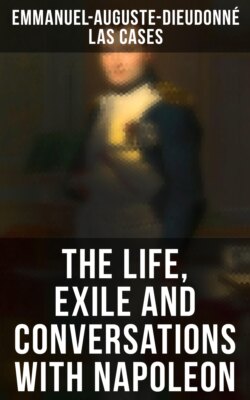Читать книгу The Life, Exile and Conversations with Napoleon - Emmanuel-Auguste-Dieudonné Las Cases - Страница 101
На сайте Литреса книга снята с продажи.
UNIFORMITY.—ENNUI.—THE EMPEROR’S SOLITUDE.—CARICATURES.
ОглавлениеTable of Contents
11th.—The Emperor read this morning the article entitled Egypt, in the Encyclopedia, and made some notes from it which cannot fail to be of service to him for his Campaign of Egypt. This circumstance gave him a great deal of pleasure; and he repeated several times in the course of the day how much he was delighted with the progress he had made. He is now sufficiently advanced to read without assistance.
About four o’clock I accompanied the Emperor into the garden: we walked by ourselves for some time, but were afterwards joined by the rest of the company. The weather was very mild. The Emperor remarked the calmness of our solitude. It was Sunday, and no workmen were to be seen. He added that we could not, at least, be accused of dissipation, or of the ardent pursuit of pleasure; in fact, it is difficult to imagine a state of greater uniformity, or a more complete absence of every sort of amusement.
The Emperor endures this mode of life admirably. He surpasses us all in equality and serenity of temper. He says, himself, that it would be difficult to be more philosophic and tranquil than he is.—He retires to bed at ten o’clock, and does not rise, that is to say, does not go out, before five or six o’clock, so that he was never more than four hours out of doors; like a prisoner who is led from his cell once a day to breathe the fresh air. But then how intense is the occupation of each day! how various are the thoughts which occupy his mind during his long solitary hours! With regard to mental exertion, the Emperor said he felt as capable of bearing it as he had ever been; that he did not feel himself worn out or withered in any respect. He was astonished himself at the slight impression that had been made on him by all the late events in which he had been the principal actor. It was like lead which had passed over marble. The spring might have been for a moment compressed, but it had not been broken, and had risen again with all its elasticity. He did not think any one in the world knew better than himself how to yield to necessity; this, he said, was the real triumph of reason and strength of mind.
The hour for our ride had now arrived. As the Emperor was going to meet the calash, he happened to see little Hortense, Madame Bertrand’s daughter, whom he is very fond of. He called her to him, caressed her two or three times, and took her out in the carriage along with little Tristan de Montholon. During the drive, the Grand Marshal, who had been looking over the papers, gave an account of some bons-mots and caricatures he had found among them. One possessed a good deal of point. The picture consisted of two actions; one represented Napoleon giving to the Princess of Hasfield, with directions to commit it to the flames, the letter whose disappearance saved her husband; underneath was written, Tyrannical Act of an Usurper. The companion was quite of another character. We described to the Emperor a great number of the caricatures with which we had been inundated after the restoration. Some of them afforded him great amusement. One in particular made him smile: it referred to a change of dynasty.
The Emperor observed that, if caricatures sometimes avenge misfortune, they form a continual annoyance to power. “I think I have had my share of them,” said he. He then desired us to describe some of those which had been made upon him, and very much approved of one as being in good taste. It was a sketch representing George III. on the coast of England, throwing an enormous beet-root, in a great passion, at the head of Napoleon, who was on the opposite shore, and saying, “Go, and be made sugar.”
